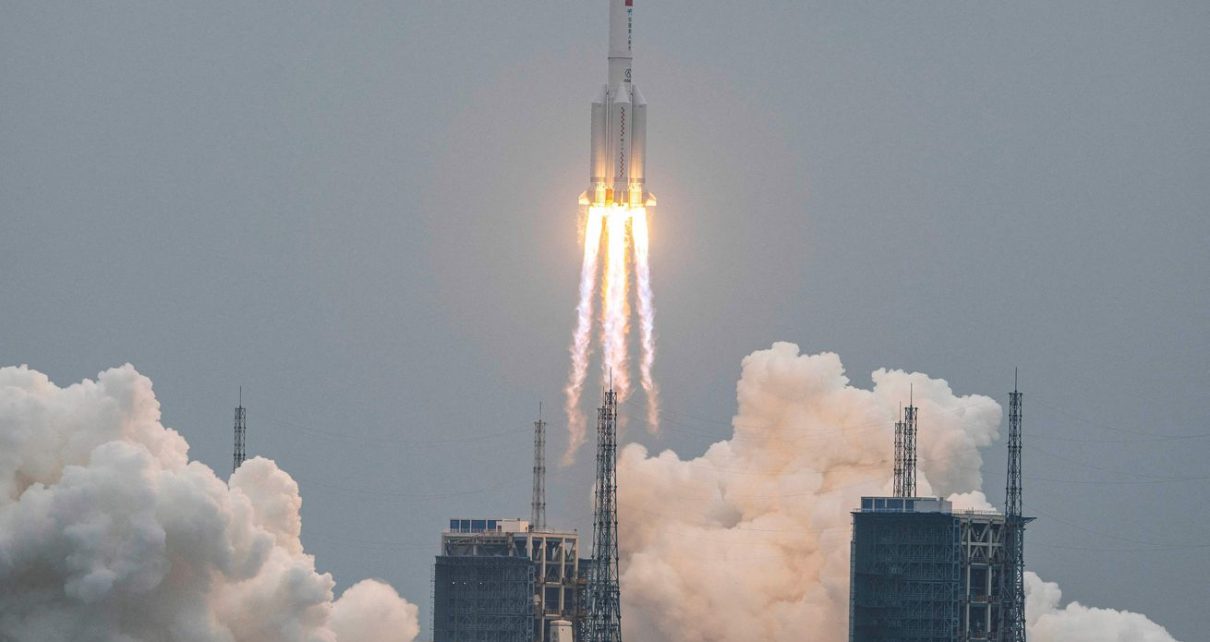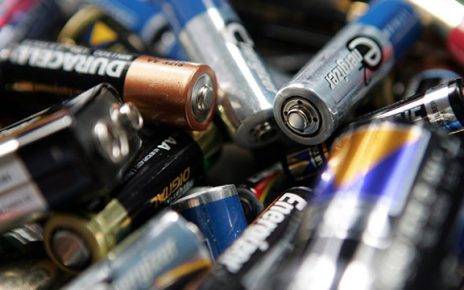
International law governing rocket reentry is too lax.
There’s a scene in The West Wing’s second season in which one of the protagonists is told a Chinese satellite is falling to Earth, but no one knew exactly when or where.
“A satellite is crashing to Earth, and NASA sent us a fax?” Donna Moss says, clearly concerned. But few in the show shared her fear, because debris in space often falls out of orbit and is either burned up upon reentry or lands harmlessly somewhere on the planet.
The US government estimates around 200 to 400 tracked objects enter Earth’s atmosphere every year — roughly one a day — out of the 170 million pieces of space debris floating above our heads. The fallen items rarely make news, though, since they usually crash into the ocean, which covers about 70 percent of the Earth’s surface, or sparsely populated areas.
Yet news of a Chinese rocket falling uncontrollably to Earth has awakened the Donna Moss in many of us.
A section of the Long March 5B rocket, which launched China’s new space station into orbit last week, is expected to hit somewhere on the planet either on Saturday or Sunday, experts say. At 10 stories and 18 tons (36,000 pounds), it’s one of the largest items in decades to spiral in an undirected dive toward the Earth.
Our latest prediction for CZ-5B rocket body reentry is:
09 May 2021 03:53 UTC ± 11 hours
Reentry will be along one of the ground tracks shown here. It is still too early to determine a meaningful debris footprint. Follow this page for updates: https://t.co/p2AU9zE3y2 pic.twitter.com/1depRKMk6f— The Aerospace Corporation (@AerospaceCorp) May 7, 2021
It could cause serious damage if it hits a major population zone, but so far few governments — especially the one in Beijing — seem overly concerned.
“The probability of this process causing harm on the ground is extremely low,” Chinese Foreign Ministry spokesperson Wang Wenbin said on Friday. The White House and Pentagon, meanwhile, say they’re tracking the rocket and have no plans to shoot it out of the sky.
After speaking with experts, two things have become clear about this episode.
The first is that the idea of a large rocket hurtling toward Earth is understandably scary. It conjures up images of a city devastated by the impact, potentially injuring thousands.
Importantly, the chance of anything like that happening is infinitesimally small — like 1 in a 196.9 million chance small. While there have been a few bad incidents in the past, nothing on that scale has ever happened, and very likely won’t now.
The second is that it’s troubling this scenario could happen in the first place. Why is it possible for China, or any other space-faring nation, to launch massive rockets and let them fall to earth willy-nilly?
The answer to that is policy failure: Despite regulations on space flight and conduct, the issue of rocket reentry is loosely and poorly regulated, so countries cut corners and take their chances that a falling rocket won’t hit anything major.
“We’re in the realm of risk management, and states are willing to swallow the risk,” said Christopher Newman, a professor of space law and policy at Northumbria University in Britain.
But there’s always the more-than-zero chance that their luck runs out and a falling rocket sparks a catastrophe. Experts are unanimous that the falling Chinese rocket is a symptom of a much larger problem that needs solving sooner rather than later.
“If you don’t want any more of this kind of thing to happen, we need the big powers to step up,” said Bleddyn Bowen, a professor of space warfare and policy at the University of Leicester in the UK.
How to stop the next falling rocket
There’s a trope about space that it’s the “Wild West,” a phrase I often catch myself using. But the truth is that there have been rules governing operations in space for decades.
In the Outer Space Treaty of 1967 and Liability Convention of 1972 are guidelines for how to punish a country that let one of its rockets cause damage on Earth. Basically, those rules say that the offending state can be held liable by the victim nation. So, in this case, if the Chinese rocket were to land in the middle of New York City (which, again, is extremely unlikely to happen), the Biden administration could ask China to pay for damages and demand other recourse.
In other words, this is a state-to-state issue. “If the rocket lands on my house, I can’t go and sue China,” Northumbria’s Newman told me. That’d be UK Prime Minister Boris Johnson’s job to call up Chinese President Xi Jinping.
But that’s really it. There’s nothing in international law to stop any nation from letting any of the 900 rockets currently in orbit from falling in an unplanned way. “This isn’t illegal,” Newman said about the current saga of the Chinese rocket. “There is no sort of regulation on an international level on reentry.”
Individual countries essentially govern themselves when they make plans to launch a rocket into space. If the Chinese government is fine with the plan of an unplanned reentry, then that’s what’ll happen at the end of the mission.
Naturally, such plans cause frustration among space experts. “I think it’s negligent of them,” Jonathan McDowell, an astrophysicist at the Center for Astrophysics in the US, told the New York Times on Thursday. “I think it’s irresponsible.” Last year, in fact, another Chinese Long March 5B rocket burned up and pieces of metal fell onto a few buildings in the Ivory Coast.
But it’s important to remember two things.
First, China — and other leading space-faring nations like the US, Russia, Japan, and the European Union — know that the chance of hitting people or infrastructure is so small that they don’t feel the need to spend extra money and time to plan for a controlled reentry.
Ensuring a rocket splashes into, say, the Pacific Ocean, requires more fuel and staff work, which increases the cost of missions. For most space agencies grappling with small budgets, cutting costs on that part of the operation is worth the risk.
Second, and relatedly, China isn’t the only country taking their chances here; others, including the US, have as well, leading to some scary scenes.
In 1978, a Soviet satellite carrying a nuclear reactor crash-landed in northern Canada and spewed radioactive waste. The next year, the NASA-launched Skylab space station — America’s first one — fell out of orbit, with parts landing in the Indian Ocean and in Western Australia, though luckily hurting no one.
“Bad behavior was quite typical by the Americans and Soviets during the space race,” said Leicester’s Bowen. “Those who live in glass houses should not throw stones,” he said of current complaints about the Chinese rocket.
While there are more safety measures now and technology has improved, experts say the main problem is still that space law is too lax on this issue. They point to the Ivory Coast incident last year, where the country decided not to seek recourse from China, potentially out of the desire to not anger a key economic partner.
So what has to change?
Experts say countries like China, the US, and others should leverage this moment and work through the United Nations to regulate rocket reentry. They should compel space programs to spend more to ensure their rockets land far away from people, and even wildlife, when possible. Even if the risk of a calamity is extremely low today, the fact that it’s more than zero is already too high.
“If this is good for anything, it’s an opportunity for everyone to take ownership of space as a domain of human activity and to want a say in how it’s governed,” said Northumbria’s Newman. “We’re now at the stage where this is generating concern.”
But until there’s political will for such action — and governments take the rocket reentry problem seriously — we’ll have more Chinese-rocket-type scares.





